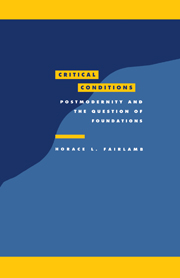Book contents
- Frontmatter
- Contents
- Preface
- Acknowledgments
- List of abbreviations
- Introduction
- 1 Fish's strong conventions: the mind's own world
- 2 Brave new words: postmodernism on epistemology
- 3 Theory and/or deconstruction: Derrida's slippage
- 4 Gadamer's universalism: the limits of hermeneutic authority
- 5 Critical politics: deconstruction for Americans
- 6 Foucault's microphysical politics: Big Brother is missing
- 7 Habermas' neo-formalism: theory as praxis
- 8 Critical theory and postmodern localism: rebels without a cause
- Conclusion
- Bibliography
- Index
3 - Theory and/or deconstruction: Derrida's slippage
Published online by Cambridge University Press: 01 June 2011
- Frontmatter
- Contents
- Preface
- Acknowledgments
- List of abbreviations
- Introduction
- 1 Fish's strong conventions: the mind's own world
- 2 Brave new words: postmodernism on epistemology
- 3 Theory and/or deconstruction: Derrida's slippage
- 4 Gadamer's universalism: the limits of hermeneutic authority
- 5 Critical politics: deconstruction for Americans
- 6 Foucault's microphysical politics: Big Brother is missing
- 7 Habermas' neo-formalism: theory as praxis
- 8 Critical theory and postmodern localism: rebels without a cause
- Conclusion
- Bibliography
- Index
Summary
Theory against itself
The necessary decentering cannot be a philosophic or scientific act as such, since it is a question of dislocating, through access to another system linking speech and writing, the founding categories of language and the grammar of the epistémè. The natural tendency of theory – what unites philosophy and science in the epistémè – will push rather toward filling in the breach than toward forcing the closure.
(OG, 92)Within the theoretical discourse of our time, one of the most provocative challenges to the philosophical foundations of our tradition comes from a collection of rigorously subversive textual practices referred to as “deconstruction.” As the opening quotation indicates, Derrida's challenge to traditional philosophy seems to oppose the philosophical ideal of coherence – the ideal to which theory gravitates – with the effect of deconstruction, which is to discover the heterogeneity of the discursive or textual conditions of theory, the fissures and ambiguities in the conceptual structure of the epistémè (the fabric of signs and texts that constitute the historical present). At times, as in the above passage, the relation between theory and deconstruction seems to be one of antagonism. When philosophy proposes an ideal order capable of appropriation by theoretical discourse, deconstructive critique shows the discourse to be already contaminated by the same impurities philosophy is trying to escape. For many, the significance of this theory-subverting power is to spell the fundamental antagonism between theory and deconstruction. Yet, even among the advocates of deconstruction, the precise relation of theory to deconstruction is not so clear.
- Type
- Chapter
- Information
- Critical ConditionsPostmodernity and the Question of Foundations, pp. 81 - 103Publisher: Cambridge University PressPrint publication year: 1994



